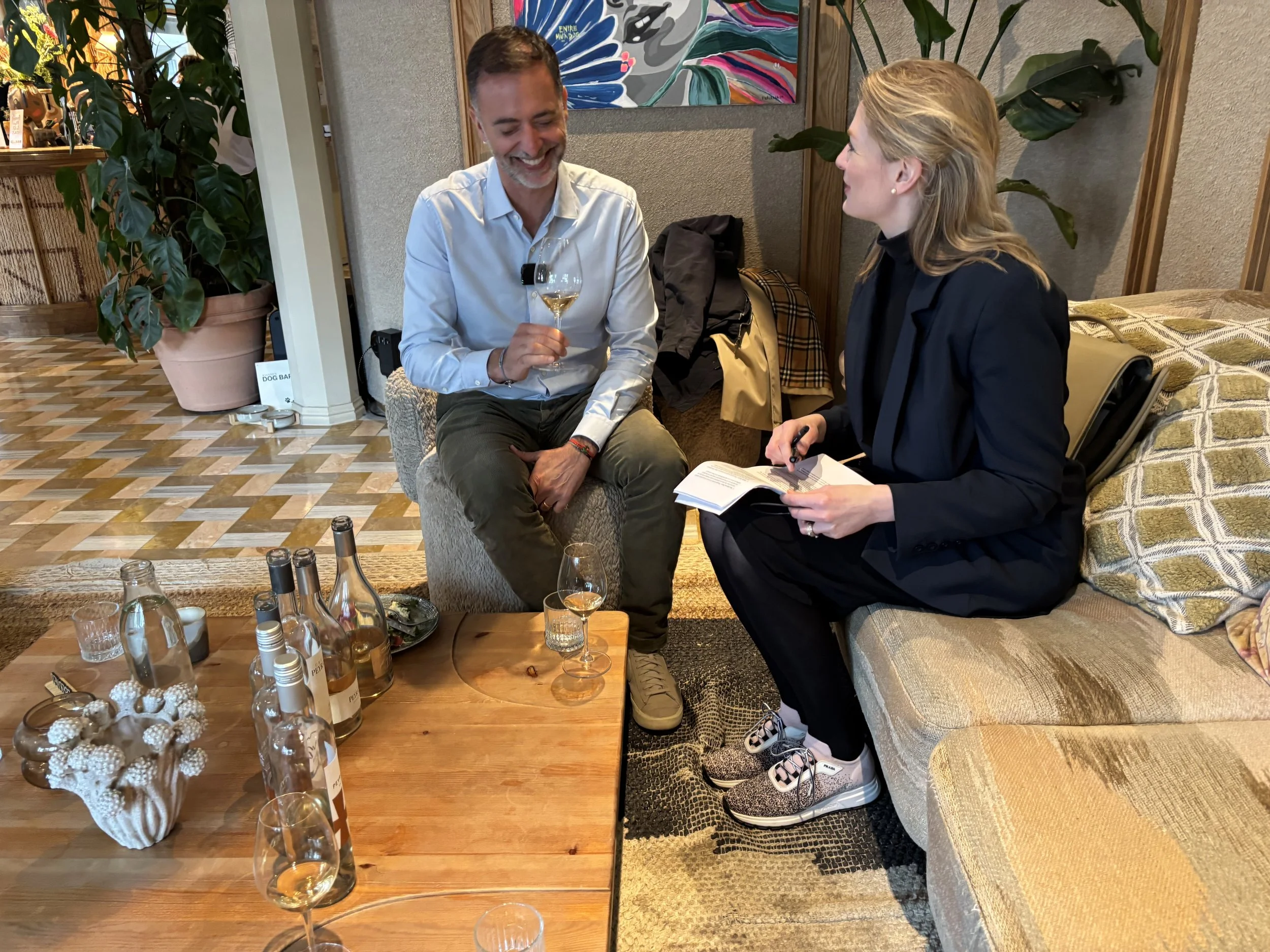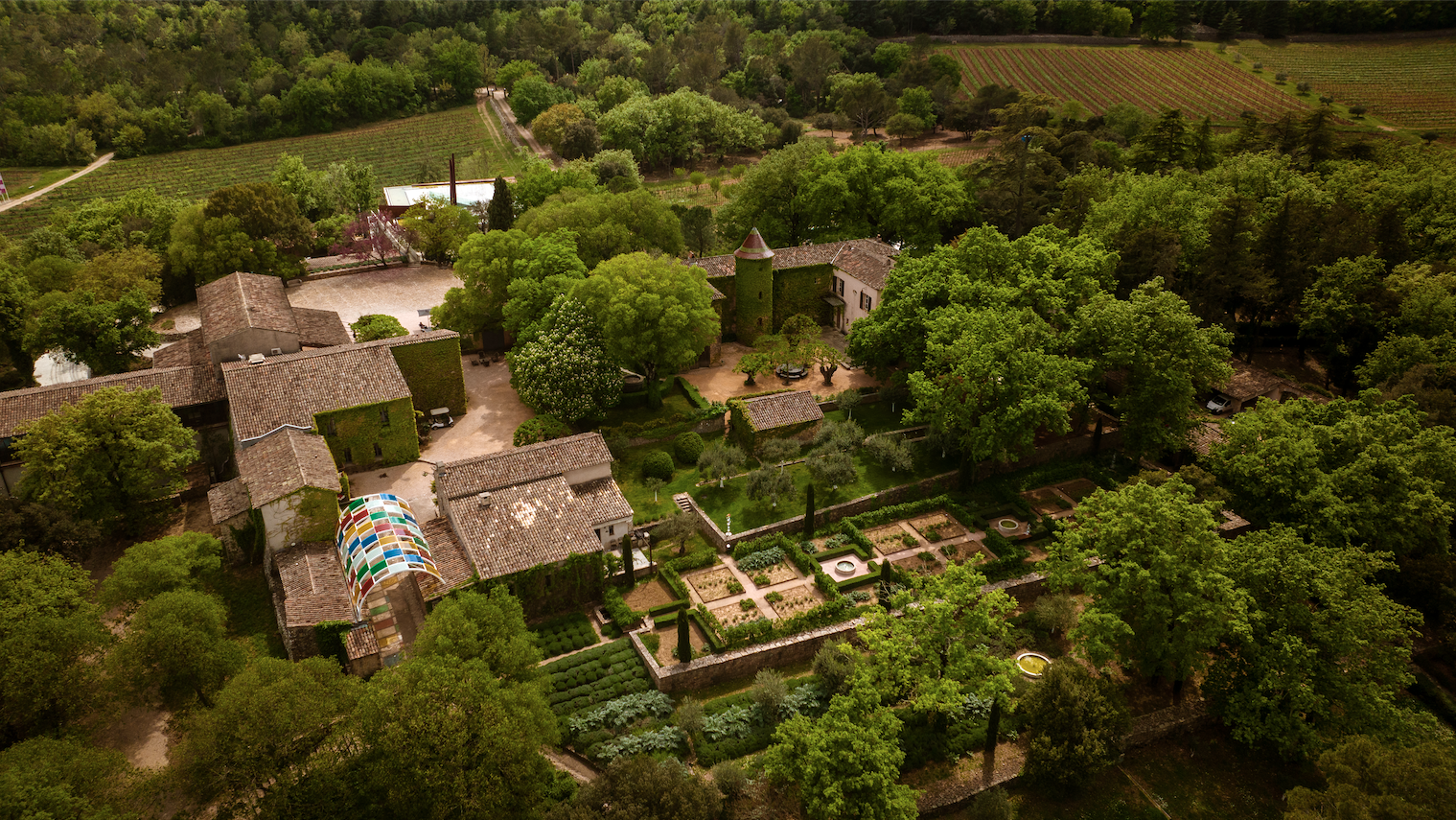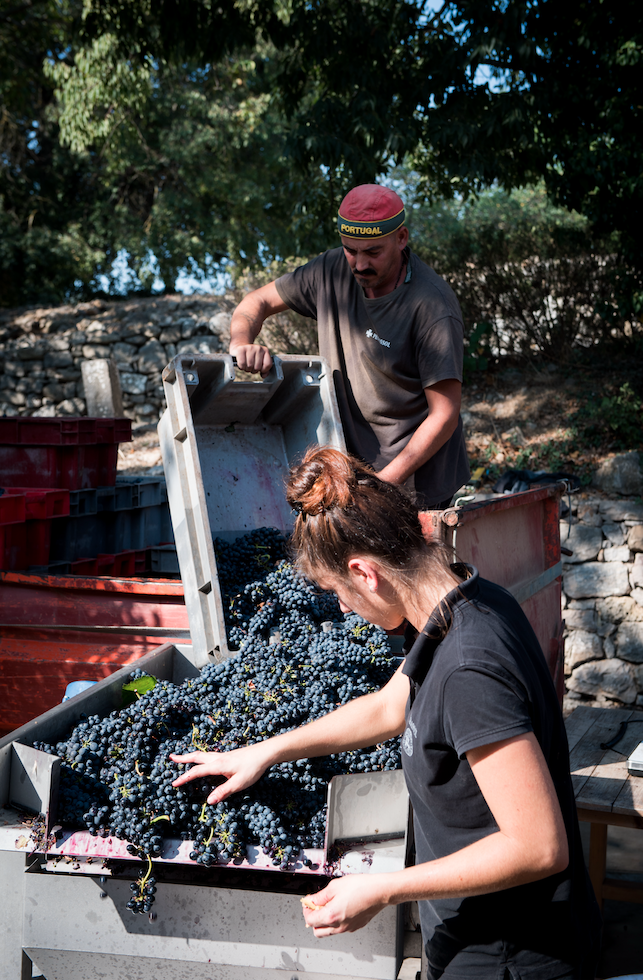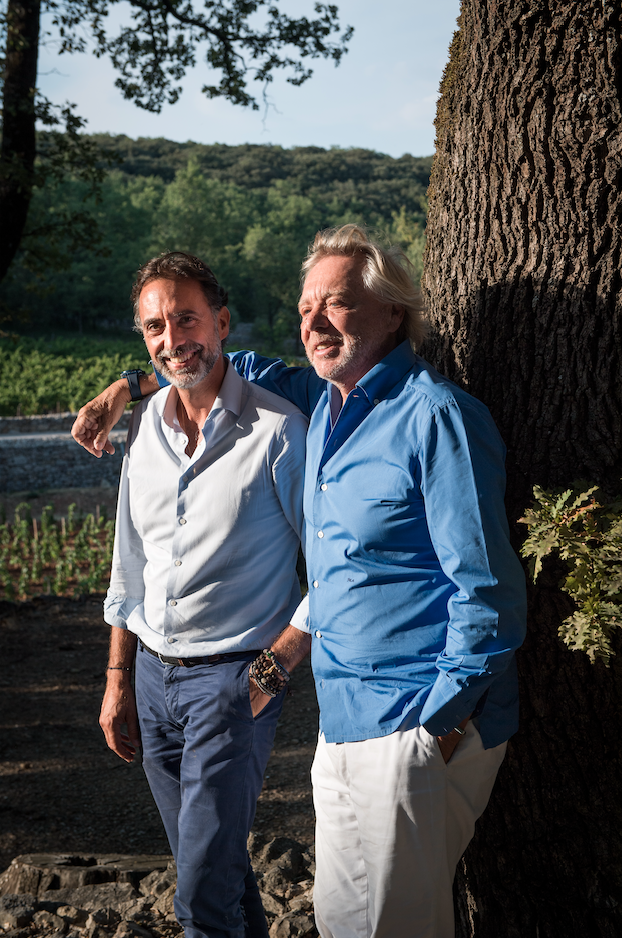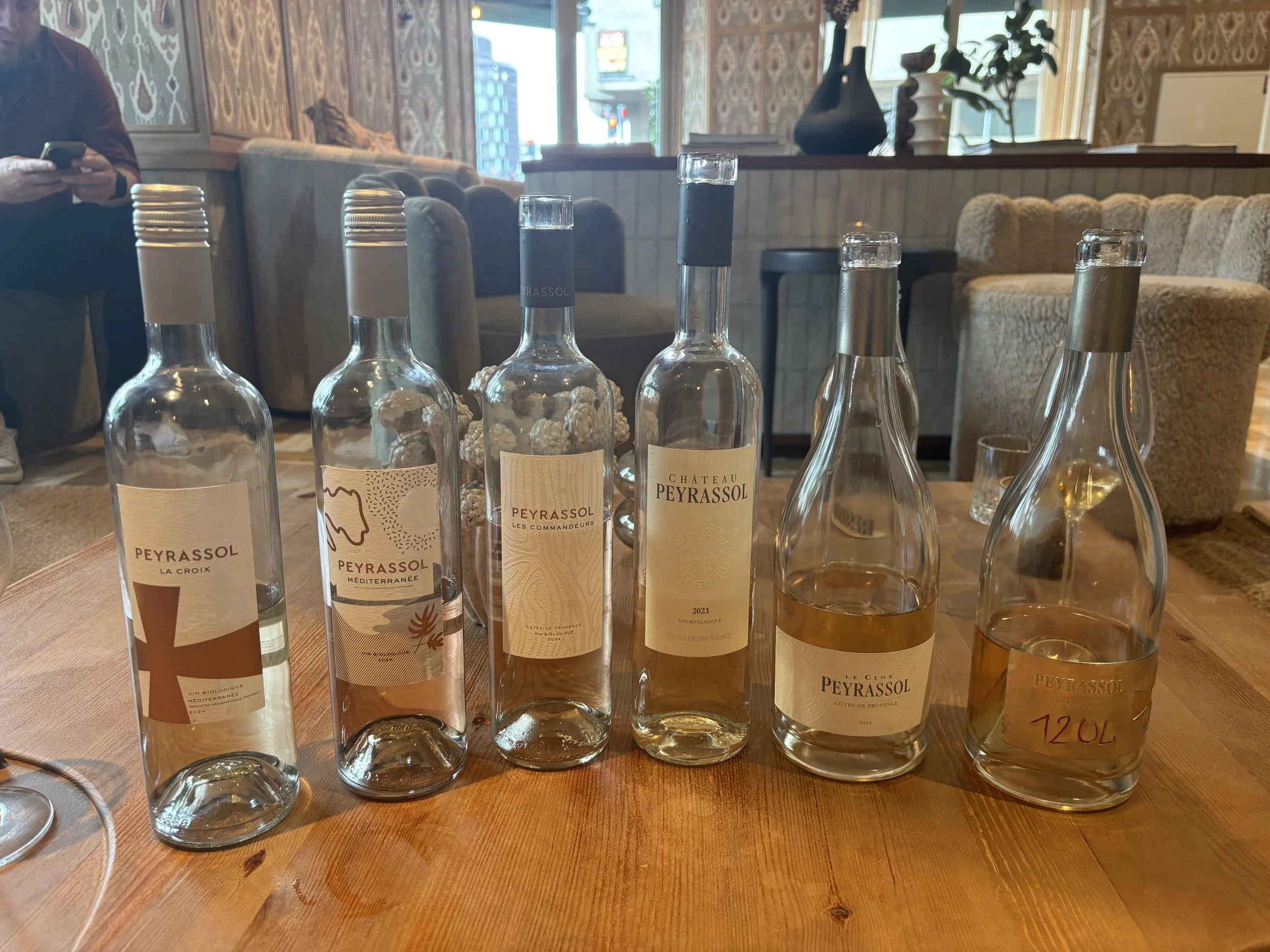Château Peyrassol: Rosé That Brings a Smile on Your Face
Alban Cacaret, Château Peyrassol, at Hotel Grand Joanne in Copenhagen. Photo: Tina Kreutzfeldt Quenée, Hans Just
I met Alban Cacaret, co-owner and director of Château Peyrassol, on a rainy day at Hotel Grand Joanne in Copenhagen. It was the kind of day that felt like November, even though it was the end of May.
But there we were, tasting rosé. The contrast wasn’t lost on Alban, he laughed as he looked toward the windows:
“Rosé is sunshine,” he said. “It’s meant for terraces, laughter, and warm evenings.”
The tasting and interview were organized by Hans Just, and despite the weather, Alban brings lightness into the room. He’s calm, grounded, and incredibly generous with his story, a story that begins not in the vineyard, but in a pharmacy.
Rosé is sunshine,” he says. “It’s meant for terraces, laughter, and warm evenings.”
“Even when I was standing behind the counter in the pharmacy, all I could talk about was what was going on up the hill at Peyrassol. It was crazy. He could see it before I even admitted it to myself”
La Commanderie de Peyrassol in Provence
From Pharmacist to Winemaker
“I wanted to be a doctor,” he tells me. “But it didn’t work out. So I became a pharmacist. Not by passion, just because it was close.” It was 2001 when his uncle invited him to move to Peyrassol, a historic estate in Provence. “I didn’t come to manage the estate at first,” Alban says. “Just to live there. My uncle thought it was important to have someone from the family on site.”
He was doing his final internship in a nearby village pharmacy when his boss called him into the office. Alban feared he had made a mistake. Instead, the pharmacist looked at him and said: “You always speak about Peyrassol. That’s where your heart is. You should be up there.”
“And he was right,” Alban says. “Even when I was standing behind the counter in the pharmacy, all I could talk about was what was going on up the hill at Peyrassol. It was crazy. He could see it before I even admitted it to myself.”
He smiles at the memory. “He told me, ‘You’ll get your diploma. But don’t stay here. Go where your passion is.’”
And so he did. “I loved it,” Alban says. “Driving the tractor, working with the team. I was like a kid again. I never looked back.”
La Commanderie de Peyrassol in Provence
“We aim for elegance. Some rosés shout. Ours whisper.”
La Commanderie de Peyrassol in Provence
A background check
Photo: La Commanderie de Peyrassol
Château Peyrassol was founded in 1204 by the Knights Templar, who cultivated vines, olives, and grains on this Provençal estate. After the Templars, it passed to the Knights Hospitaller, and remained under church ownership until the French Revolution. In the 19th century, it entered private hands, and in the 1960s Françoise Rigord helped shape its modern identity, putting Peyrassol on the map for elegant, dry rosé.
Since 2001, Alban Cacaret and his uncle Philippe Austruy have restored the estate’s vineyards, buildings, and historic commandery. Peyrassol is now fully organic, home to art installations, and focused on precision winemaking that honors centuries of tradition, with every rosé carrying a little piece of that legacy.
Learning by Doing
With no formal wine education, Alban learned the ropes the old-fashioned way. “Day by day. Watching. Helping. Asking questions.” His pharmacy background gave him an edge in understanding fermentation and chemical processes, but the real learning came in the fields and the cellar.
One of his most formative experiences was blending. “Blending is not just technical,” he says. “It’s emotional. It’s where you choose the story you want to tell.”
The previous owner, a woman from the estate’s old family, stayed on for three years to help with the transition. “She taught me how to blend,” Alban says. “It was the most important part. We’d sit together, taste, talk, adjust. That’s where I really learned.”
“Blending is where you create the wine,” he adds. “It’s the moment when knowledge and emotion come together.”
When I ask him if he still apart of blending the wine he says:
“Me? Oh yeah, I blend everything. Always with the winemaker and our consultant. But I never bottle anything if my uncle hasn’t tasted it.”
“It’s important to keep the style. My uncle helps us stay in our time. That’s the continuity.”
“Blending is where you create the wine. It’s the moment when knowledge and emotion come together.”
Restoring an 800-Year-Old Estate
Alban Cacaret and his uncle Philippe Austruy. Photo: La Commanderie de Peyrassol
When Alban and his uncle took over, the buildings were in disrepair, and much of the vineyard needed replanting. “We did everything,” he says. “We rebuilt the cellar, restored the stone walls, replanted vines and olive trees.”
Sustainability was central to their mission. “We stopped using chemicals immediately,” he says. “But full organic certification took 20 years.” In 2021, Château Peyrassol released its first fully certified organic vintage.
The estate now spans 900 hectares, mostly forest, with vineyards scattered like patches of mosaic. “We work in harmony with the land,” Alban says. “It’s a forest with vines in it, not the other way around.”
“We had to rebuild terraces, reconstruct stone walls, even fix erosion. The beauty people see now is the result of 20 years of hard work.”
The Peyrassol Rosé Way
We begin the tasting with La Croix IGP Blanc, a white wine made from Rolle, also known as Vermentino. “This is what I call a wine to drink, not to talk about,” Alban says with a smile. It’s fresh, clean, and balanced. “Nothing sticks out. Not the acidity, not the alcohol. It’s just friendly.”
“The Provence style is this elegance, much more festive. Peyrassol style is like this. It’s very elegant and delicate.”
“You will never have a powerful nose, like strawberries or grapefruit. Our rosé is subtle. Sometimes people are disappointed at first, but then they understand – it stays longer in the mouth, with so many different layers.”
Then comes Commanderie de Peyrassol, the estate’s flagship cuvée. “This is the style people expect from us,” he says. “Cinsault, Grenache, Syrah. Very pale, very clean.” It’s subtle on the nose but opens beautifully on the palate. “We aim for elegance. Some rosés shout. Ours whisper.”
Tasting Flight Château Peyrassol. Photo: Ronja Bo Gustavsson
We reach the Château Peyrassol Rosé, the estate’s signature. “This is what Provence rosé should be,” Alban says. “Silky, fresh, with a little bitterness for backbone.”
“Rosé is sunshine. I don’t want to convince people to drink it in winter. It’s for terraces, for laughter, for friends. Let it be that.”
We taste Clos Peyrassol next, a wine from a five-hectare walled vineyard on the estate. “We call it our microcosm,” Alban says. “All the varieties are there. Cabernet Sauvignon, Syrah, Rolle, Tibouren. We make a white, red, and rosé from that one plot.” The Clos rosé is more structured, with complexity and layers.
“When we blend, we really take care of the color. Rosé must be clear, shiny, and pink. Sometimes we even change the blend just to get the right color.”
Next, we move to a barrel-aged rosé from 2021. “This is something different,” Alban says. “We don’t make it every year. It depends on the vintage.” Aged in large, neutral barrels, this rosé has more structure and depth. “It’s gastronomic,” he adds.
No Rules
Throughout the tasting, Alban returns to one theme. Freedom. “Once I put the wine in the bottle, I want people to enjoy it how they like,” he says. “With ice, with sparkling water. If it brings you joy, it’s good.”
He doesn’t push people to drink rosé year-round either “Rosé is sunshine,” he says again. “I don’t want to convince people to drink it in winter. It’s for terraces, for laughter, for friends. Let it be that.”
When I suggest that he could challenge us to drink rosé in winter, he shakes his head. “No. I don’t want to push it like that. Let it be sunshine.”
A Place to Experience
Château Peyrassol's future is in building experience, they now have 20.000 visitors a year. The estate now has two restaurants, one Michelin-starred, guest houses, artisan markets, and sometimes concerts. And they are planning to expand.
“We want to be elegant, but also fun,” Alban says. “Wine should bring pleasure. It should bring a smile to your face.”
And it did, even on a rainy day in Copenhagen (!)


